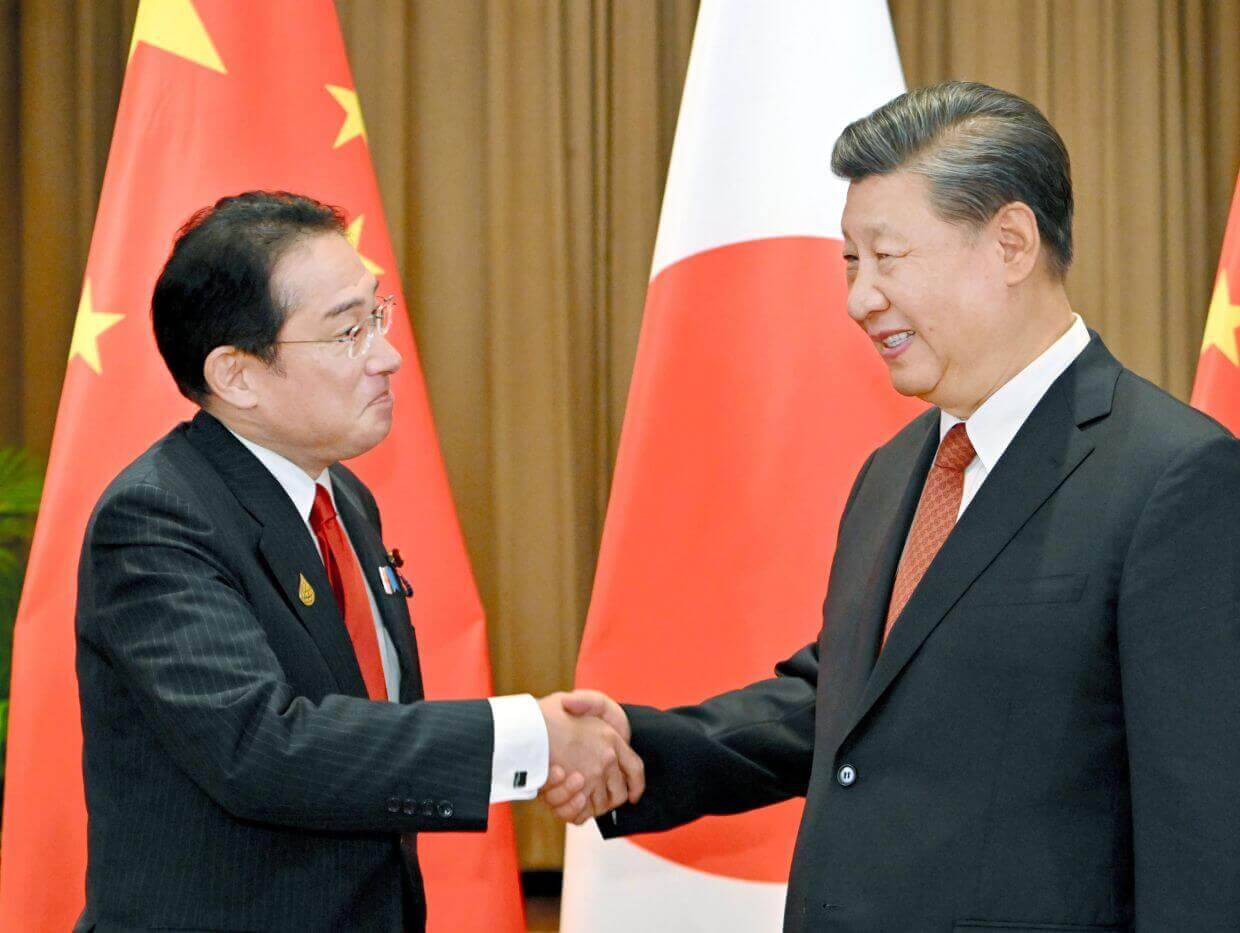During his meeting with Japanese Prime Minister (PM) Fumio Kishida in Bangkok on Thursday, Chinese President Xi Jinping said that the two sides must build a bilateral relationship “fit for the new era” and find ways to “be partners, not threats.”
Xi emphasised that Beijing and Tokyo must “treat each other with sincerity… and trust,” and “and translate into policies the political consensus that the two countries should “be partners, not threats.”
Xi noted that “major issues of principle,” such as Taiwan, has a bearing on “the political foundation and basic trust” in their bilateral relationship, and “therefore must be handled appropriately.”
PM Kishida: I held a summit meeting with President Xi Jinping of China. (November 17)@kishida230 pic.twitter.com/eoDPqRM4At
— PM's Office of Japan (@JPN_PMO) November 18, 2022
Xi stressed that the two sides should “respect each other, increase understanding and dispel mistrust.” Referring to their maritime and territorial disputes, Xi asserted that “it is essential to abide by the principles and common understandings that have been reached, and show political wisdom and responsibility to properly manage differences.”
“The two sides should continue to leverage their geographical proximity, close people-to-people ties and other unique strengths, and facilitate exchanges and communication” through various channels, Xi said.
Noting that their economies are “highly interdependent,” Xi underscored the need to “step up dialogue and cooperation” in the fields of “digital economy, green development, fiscal and financial sectors, health care, and old-age care.”
He also stressed on the need to keep “the industrial and supply chains stable and unclogged” to help realise “complementarity and mutual benefits at a higher level.”
Xi concluded by saying that Beijing and Tokyo must “uphold strategic autonomy and good-neighborliness, reject conflict and confrontation, practice true multilateralism, advance regional integration, work together for sound development and progress in Asia, and respond to global challenges.”
Kishida responded by saying that although their relations “face many challenges and issues as well as various possibilities for cooperation,” Tokyo and Beijing both shoulder “huge responsibilities for the peace and prosperity of the region.”
To this end, the PM suggested they accelerate efforts to build a “constructive and stable” relationship by “engaging in candid dialogue, acting together as responsible nations on international challenges, and cooperating on common issues.”
On the issue of Taiwan, Kishida declared that there is “no change whatsoever” to Japan’s commitments made in the Japan-China Joint Statement. Nevertheless, he reiterated “the importance of peace and stability across the Taiwan Strait.”
a constructive and stable Japan-China relationship. This became a great start to advancing our dialogues aimed at establishing a constructive and stable Japan-China relationship. (2/2) (November 17)@kishida230
— PM's Office of Japan (@JPN_PMO) November 18, 2022
In this regard, PM also expressed “grave concern” about developments in the East China Sea, including the situation surrounding the Senkaku Islands, as well as Chinese military activity near Japan, such as the People’s Liberation Army’s launch of ballistic missiles into waters near Japan, including into its Exclusive Economic Zone (EEZ) in August.
Keeping this in mind, Xi and Kishida agreed to accelerate the launch of a hotline under the Maritime and Aerial Communication Mechanism and strengthen communication through the Japan-China Security Dialogue.
Kishida also utilised the 45-minute meeting to “strongly” call for the “prompt lifting of import restrictions” on Japanese food products by China.
The Japanese leader also brought up the situation in Ukraine and called on China to “play a responsible role in maintaining international peace and security.” Both sides shared their mutual concern about Russia’s possible future use of nuclear weapons in Ukraine, calling the possibility “extremely alarming.” They agreed that nuclear weapons “must never be used” and that “nuclear war must never be fought.”
President Xi Jinping met with Japanese Prime Minister Fumio Kishida. President Xi noted that as close neighbors and important countries in Asia and the world, China and Japan share many common interests and ample room for cooperation. pic.twitter.com/e35SlIbOPL
— Hua Chunying 华春莹 (@SpokespersonCHN) November 18, 2022
On the topic of North Korea’s increased nuclear and missile activities, Kishida expressed hope that “China will fulfill its role, including in the UN Security Council.” He also requested Xi for “understanding and support” on the “immediate resolution of the abductions issue.”
They concluded by agreeing “to maintain high-level interactions, dialogue and communication, enhance political mutual trust, promote practical cooperation,” and “step up cooperation in international and regional affairs.”
Chinese Foreign Ministry spokesperson Mao Ning said of their meeting yesterday that the two countries “are close neighbours and important countries in the region.” Noting that this year marks the 50th anniversary of the normalisation of their relations, Mao emphasised that Beijing hopes both countries “will stay committed to peace and friendship, expand mutually-beneficial cooperation, and manage differences.”
Japan has been embroiled in a decades-long dispute with China over the Senkaku/Diaoyu islands. In this regard, Japan recently revealed that it is considering increasing the range of a new high-speed missile beyond 1,000 kilometres to help better defend its remote islands. It is also mulling over expanding its artillery by buying US-developed Tomahawk cruise missiles and deploying more than 1,000 long-range cruise missiles to the Nansei island chain as a means to narrow the “cavernous missile gap” with China.
The Japanese Ministry of Defence’s annual white paper released in July underscored that the country’s three biggest threats are China, North Korea, and Russia.
In light of these growing threats, Japan is reportedly evaluating whether or not to change its national security strategy to include the use of pre-emptive strikes, which critics like China say would violate the country’s pacifist post-war constitution. Kishida also plans to increase defence spending to 2% of the GDP.

